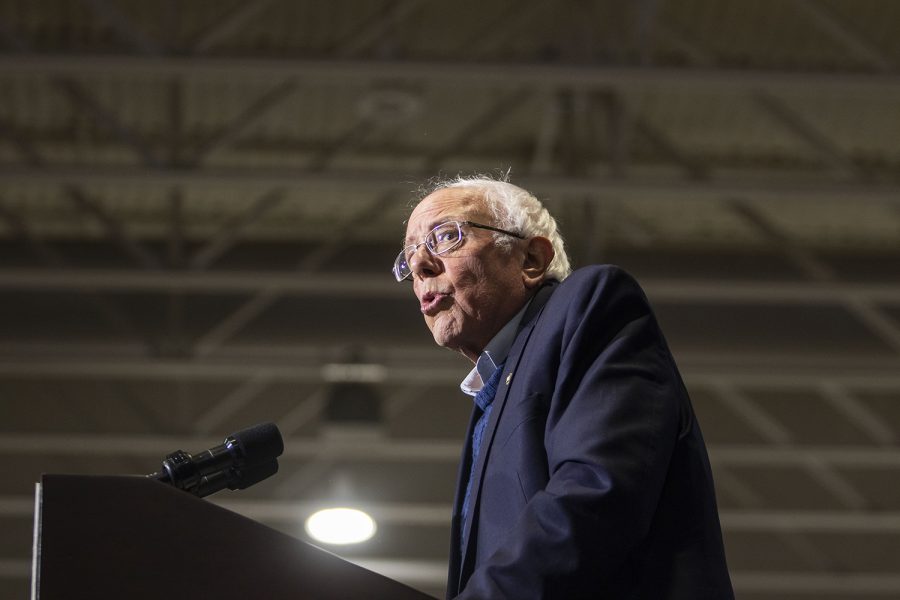Opinion: A contentious primary is a good thing for the eventual Democratic nominee
Selecting a presidential candidate is not an easy time, and calls to lessen hostility aren’t constructive.
Sen. Bernie Sanders, I-Vt, addresses supporters at his rally at the Coralville Marriott Hotel and Conference Center on Saturday, Nov. 9, 2019. Sen. Sanders and Rep. Osasio-Cortez spoke on climate change and women’s rights.
February 10, 2020
With the Iowa caucuses come and gone, the end of the Democratic presidential-nomination race is in sight. With Democrats finally deciding who they actually support in the primary, the online sphere has become rather vicious and will get worse before it gets better.
That’s a good thing.
This coming election is going to be an absolute nightmare. President Trump’s cabal of alt-right and nationalist followers will produce the most vile, vitriolic attacks imaginable against whomever the opposition puts forward. The eventual nominee needs to be battle-tested.
Anything a Democrat throws at another Democrat will pale in comparison to the attacks that will come for them in November.
A lot of the political discussion is happening online, with supporters of different Democrats going after each other. It’s not as though this online bashing is unsubstantiated. There are real criticisms beyond petty quarreling.
Pete Buttigieg’s current nickname is a quintessential example of this. Due to the former South Bend, Indiana mayor’s lack of black support and milquetoast policies, Buttigieg has earned the moniker “Mayo Pete.” It’s become so widespread that even Saturday Night Live used it in its most recent cold open segment. While it may seem a bit childish to use the nickname, it’s definitely more mild than whatever Trump may throw his way should Buttigieg obtain the nomination.
As the race continues, Buttigieg’s response to “Mayo Pete” will show whether or not he has the ability to fight back against such tactics.
Sen. Bernie Sanders, I-Vt., has also had his fair share of pushback, from being called religiously “unaffiliated” after talking about his Jewish background to having SNL talk about “Bernie Bros” that spring from 4chan boards. Perhaps the most direct accusation is the idea that “nobody likes Bernie,” as stated by his 2016 Democratic rival Hillary Clinton.
There are a myriad of other accusations and easily spread criticisms of Sanders that are going about the internet. Even having won the popular vote in the Iowa caucuses, the Sanders campaign will have to direct serious effort to addressing everything being thrown their way.
This is what the primary needs to be.
While the debates are a useful tool for discussing policy, it has recently become more and more about addressing the most recent drama online and giving the candidates an opportunity to respond to it. This isn’t surprising, given that about two-thirds of Americans get at least some of its news from social media. If there is something online that is of interest to the electorate, it must be addressed publicly.
It has become necessary to address nearly everything that pops up online due to the fact that, if left unaddressed, the silence can be interpreted as weakness. If there is no comeback, then the accused is clearly guilty in the public eye. When November comes, there must be no silence.
While there will inevitably come a time for Democrats to stand united and “vote blue no matter who,” civility has its time and place, but that time is not now.
In order to get a candidate who can go toe-to-toe with not only Trump, but his cadre of internet-wielding supporters, we need to put the candidates through the wringer. If a campaign cannot address its candidate being likened to a condiment, it is hard to imagine the operation winning a presidency.



